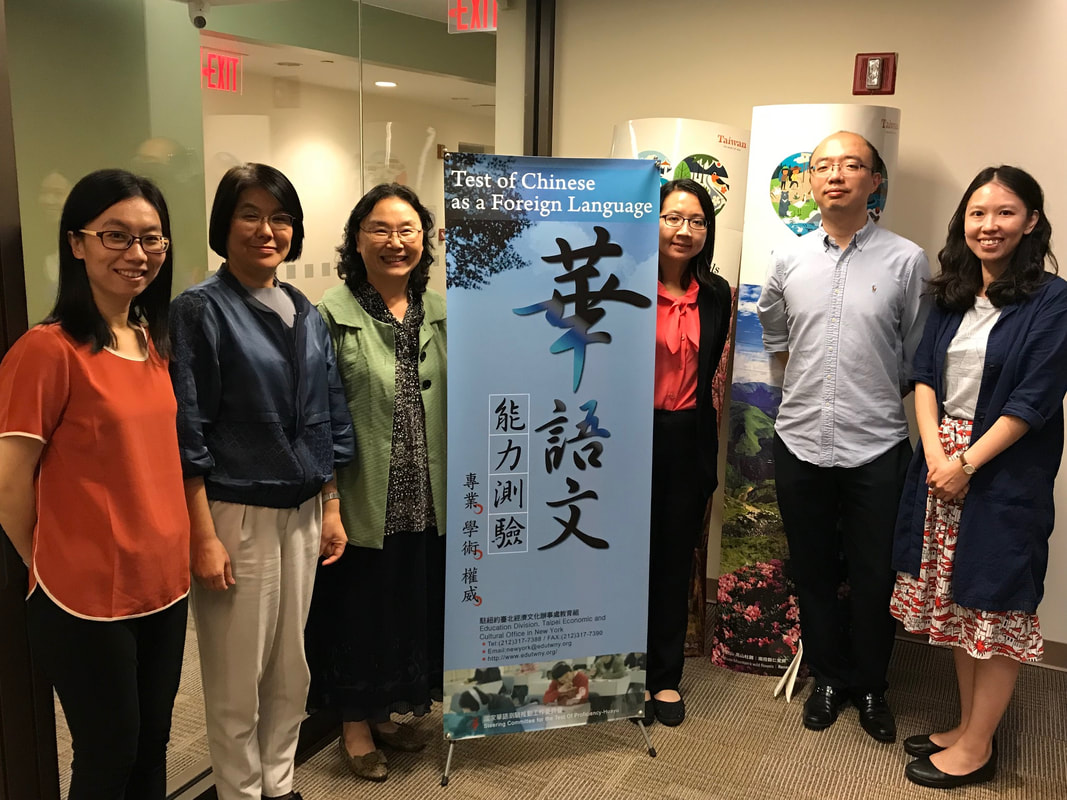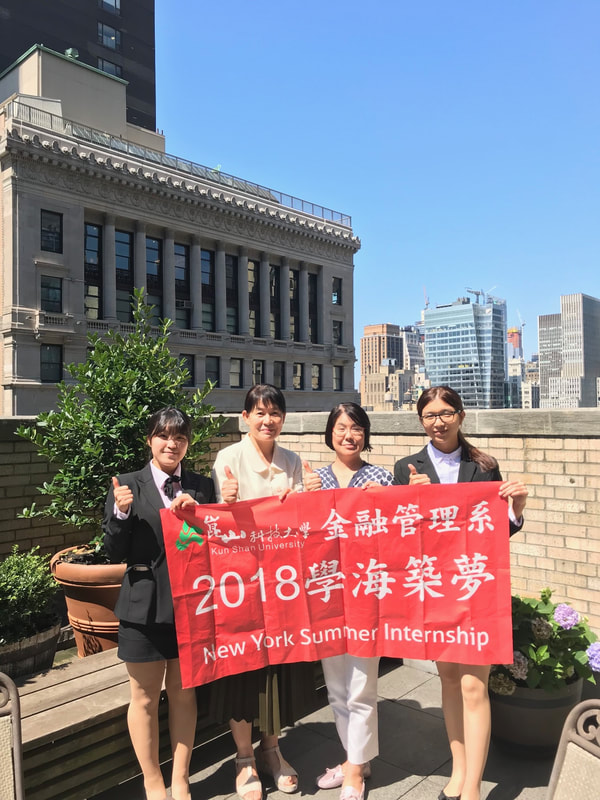|
設有漢語領航中心( Chinese Flagship Program) 的紐約市立大學Hunter College古典東方語言文學系中文部主任趙德麟教授一行4人拜會本組,由教育組楊敏玲主任親自接待並主持會議,針對如何推動華語文能力測驗,鼓勵美國學生赴台灣學習華語等事宜進行討論。
7/9新任駐紐約教育組楊敏玲主任會同駐華府教育組遲耀宗組長與大紐約地區學生聯合會主要幹部共同餐敘,討論未來合作事宜,並見證新舊任會長交接儀式。原任會長: 陳采瑜,新任會長:林家興。 Yushan Project To strengthen the recruitment and retention of exceptional academic and research talent, the Ministry of Education (MOE) plans to launch the Yushan Project in 2018. By making teaching and research salaries in Taiwan more competitive internationally and easing restrictions on the salary system to make wages more flexible, Taiwan will be able to build a superior academic environment and provide sufficient resources to attract and retain exceptional talent. There are three parts to the project : the selection of foreign “Yushan Scholars”, staffing fund for universities to make flexible wage payments for top talent, and a 10 percent hike in the research pay of full-time professors. A.Yushan scholars: Recruit globally This program aims at recruiting top academic and research personnel newly hired from abroad. The program will select both established scholars and young and upcoming academics, without focusing on a particular age group. Yushan scholars will be eligible for up to NT$5 million per year on top of existing salaries. The grants will continue at least three years, with the possibility of renewal. B.Flexible wage payments: Promote excellence in universities Subsidies worth NT$2 billion per year will be provided to give greater flexibility in paying top talent. The funds may be used to pay existing academics and researchers as well as new hires. Universities will control their own flexible salary structures for faculty as part of efforts to recruit and retain talent. The pay rules they establish must then be submitted to the MOE for reference. C.Research allowance increase for professors: Widen pay gap to reflect talent To help retain excellent professors, annual investments of NT$600 million (US$19.8 million) will go to public colleges and universities to increase allowances for professors by 10 percent, with monthly allowances to rise from NT$54,450 to NT$59,895. Starting in 2018, an additional NT$550 million will be awarded to private colleges and universities
Taipei, Taiwan -- The Ministry of Education (MOE) announced the launch of Huayu 101, a new online Mandarin learning initiative, at the end of May. This is one of several to attract and motivate more young people to learn Mandarin in Taiwan.
Huayu 101 taps into learners’ interest in Taiwan and its culture. The designer of Huayu 101, Professor Chang Yuhsin from the University of Taipei, has been teaching Mandarin for more than 20 years. He and his team collected key basic survival phrases that people can immediately use, covering topics such as accommodation, shopping, ordering food, transport, and getting emergency help. Foreign students and travelers will find the material really useful in Taiwan and other Mandarin-speaking regions. The MOE worked with Logan D. Beck, a YouTube enthusiast, to produce two videos about Taiwan’s culture and learning Mandarin: Dajia Mazu Pilgrimage, and Taiwan Night Market Street Food. The first video drew 50,000 views the night it was launched and it’s been watched more than 150,000 times since. Beck and a popular rice cake seller, Mr. Liu, attended the launch and showed some Huayu 101 video footage featuring them in a scene set in a night market. The global demand for Chinese language education led to the planning and implementation of the Eight-year Chinese Language Education Promotion Plan (2013–2020). Taiwan’s Chinese language education sector has been vigorously marketing itself internationally, and the Office of Global Mandarin Education (OGME) was set up to integrate the Chinese language education resources in Taiwan. Another exciting initiative that similarly integrates Taiwan’s tourism resources and language learning resources is Mandarin On-the-Go. The MOE worked with the Ministry of Transportation and Communication Tourism Bureau, and the Small and Medium Enterprise Administration of the Ministry of Economic Affairs to create this new study-tour model. You can find lots of information about both of these initiatives on the OGME website: https://ogme.edu.tw/Home/tw Contact details: Office of Global Mandarin Education OGME (OGME) Chi Kuo-Ning Tel No: +886-2-2391-1368 ext.1360 Email: [email protected] Taipei, Taiwan -- The Ministry of Education (MOE) announced the launch of Huayu 101, a new online Mandarin learning initiative, at the end of May. This is one of several to attract and motivate more young people to learn Mandarin in Taiwan. Huayu 101 taps into learners’ interest in Taiwan and its culture. The designer of Huayu 101, Professor Chang Yuhsin from the University of Taipei, has been teaching Mandarin for more than 20 years. He and his team collected key basic survival phrases that people can immediately use, covering topics such as accommodation, shopping, ordering food, transport, and getting emergency help. Foreign students and travelers will find the material really useful in Taiwan and other Mandarin-speaking regions. The MOE worked with Logan D. Beck, a YouTube enthusiast, to produce two videos about Taiwan’s culture and learning Mandarin: Dajia Mazu Pilgrimage, and Taiwan Night Market Street Food. The first video drew 50,000 views the night it was launched and it’s been watched more than 150,000 times since. Beck and a popular rice cake seller, Mr. Liu, attended the launch and showed some Huayu 101 video footage featuring them in a scene set in a night market. The global demand for Chinese language education led to the planning and implementation of the Eight-year Chinese Language Education Promotion Plan (2013–2020). Taiwan’s Chinese language education sector has been vigorously marketing itself internationally, and the Office of Global Mandarin Education (OGME) was set up to integrate the Chinese language education resources in Taiwan. Another exciting initiative that similarly integrates Taiwan’s tourism resources and language learning resources is Mandarin On-the-Go. The MOE worked with the Ministry of Transportation and Communication Tourism Bureau, and the Small and Medium Enterprise Administration of the Ministry of Economic Affairs to create this new study-tour model. You can find lots of information about both of these initiatives on the OGME website: https://ogme.edu.tw/Home/tw Contact details: Office of Global Mandarin Education OGME (OGME) Chi Kuo-Ning Tel No: +886-2-2391-1368 ext.1360 Email: [email protected] |
Archives
June 2023
|
||||||
© 2023 Education Division, Taipei Economic & Cultural Office in New York | 駐紐約臺北經濟文化辦事處 教育組
1 East 42nd Street, 6th Floor, New York, NY 10017 | Phone: (212) 317-7389/7386
1 East 42nd Street, 6th Floor, New York, NY 10017 | Phone: (212) 317-7389/7386


